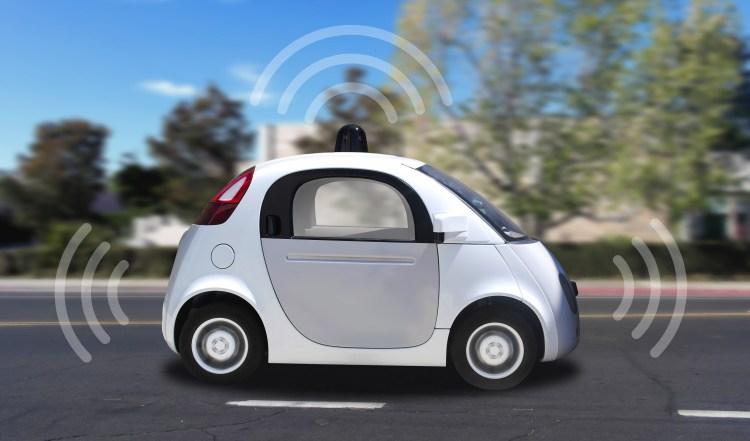The thought of self-driving cars on the road seems like a distant dream, yet they’re on the road today, and will be available to the general public within five years. Similarly, in the B2B world, artificial intelligence (AI) and predictive technologies represent a disruptive shift that’s forcing companies to reimagine how they operate. We’re already seeing visible examples such as programmatic bidding in the advertising world. In five years, many parts of our business will likely be driven by AI.
With that in mind, here are eight questions everyone is asking about self-driving cars, each of which has an important parallel that helps frame AI’s impact on business and society at large.
Will we be able to trust them?
Google’s self-driving cars have already driven 1,210,676 miles yet, as of July this year, there had only been 14 accidents — all caused by human error, not by the software. Given the fact that around 33,000 people die in traffic accidents in the U.S. every year, and much of blame falls to distracted drivers, there is a huge opportunity to make our roads safer.
In the B2B world, very few of our decisions are life or death, but there is still important revenue at stake. Machine learning can be used to develop models, but it’s still important for a data analyst to validate them and put the right safety checks in place. When the models are live, someone needs to monitor the impact of any changes and watch for drift in performance to ensure continued accuracy.
Will I ever own one?
The thing that sucks about self-driving cars is that many of us may never have our own. The ability to run cars autonomously changes the economics of ownership. It will no longer make sense to own an expensive asset that we only use 5 percent of the day, when we could instead just request a car precisely when we need it.
Within B2B, this would be like rolling your own custom-built algorithms. The reality is that most companies will consume predictive-as-a-service instead. That’s because to operate highly accurate models, they’d need to be vicious about acquiring data, building connectors, and tuning performance. Just like having access to a fleet of self-driving cars, there are economies of scale and network effects that make subscribing to best-of-breed services appealing.
What are the ethical impacts of AI?
The software that drives the car is programed to make decisions that aren’t always black and white. For example, if a fatal accident is imminent, are the passengers’ lives more valuable than those outside the car? And who has authority to override the car’s logic — the government, the vendor, or the owner?
When it comes to businesses, AI might decide who to promote and who to fire, what level of service each customer gets, or even the price they’re charged. That raises the question: Who writes the rules for those algorithms, and how can we know whether we’re taking customer profiling too far?
Who is liable?
In a world where cars are driven by software, vendors take on new levels of liability for ensuring that things won’t go wrong. If there is a fatal crash, is it the manufacturer’s fault, the vehicle’s owner (whether that be an individual car owner or a fleet manager), or the passenger who failed to override the car’s computer and take over? A recent episode of The Good Wife asked this question in a case where the “driver” was an employee of the self-driving car manufacturer, and the victim sued both the person who was testing the car at the time of the accident and the company itself.
B2B companies are used to starting with an empty database and a vendor that’s just responsible for making sure their software is accessible and doesn’t crash. But with predictive technologies, that’s no longer the case. AI vendors need to be aware of the outcomes each particular client is trying to predict and where they want to steer their business. This puts them directly in the path of revenue, so if a quarter is off, we might ask, “Is this the VP of sales’ responsibility or the vendor’s?”
Will today’s established players be leaders or laggards?
While there is little doubt that players like Toyota, Ford, and Volkswagen will be in the mix, self-driving cars will still represent a disruptive shift for the auto industry. Because of the electrification of cars and the importance of software, players like Google, Apple, Tesla, and Uber may well lead the pack.
In the B2B space, Salesforce and Marketo will be in the AI mix; however, they’re faced with competing priorities from their legacy businesses, and they have a very different relationship with regards to data visibility. The new players that are emerging don’t have those constraints and can focus all their energy on acquiring data, building advanced models, and feeding applications with intelligent recommendations. Only time will tell who will win, but I sure look forward to watching it all play out.
Guest post by Jamie Grenney, VP Marketing, Infer.
Prior to leading marketing at Infer, Jamie spent eleven years at Salesforce.com, most recently as the VP of Social Media & Online Video. During his tenure he held various roles across the organization. He was instrumental in defining the inside sales process, pioneered salesforce.com‘s SMB marketing efforts, and helped shape many parts of the product roadmap. Jamie is well known for his thought leadership content on topics such as CRM adoption, sales & marketing best practices, crowdsourced innovation, viral marketing, and social strategy.
VentureBeat's mission is to be a digital town square for technical decision-makers to gain knowledge about transformative enterprise technology and transact. Learn More

